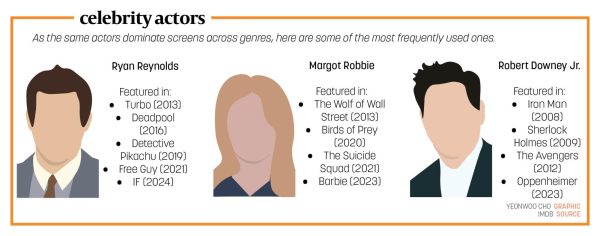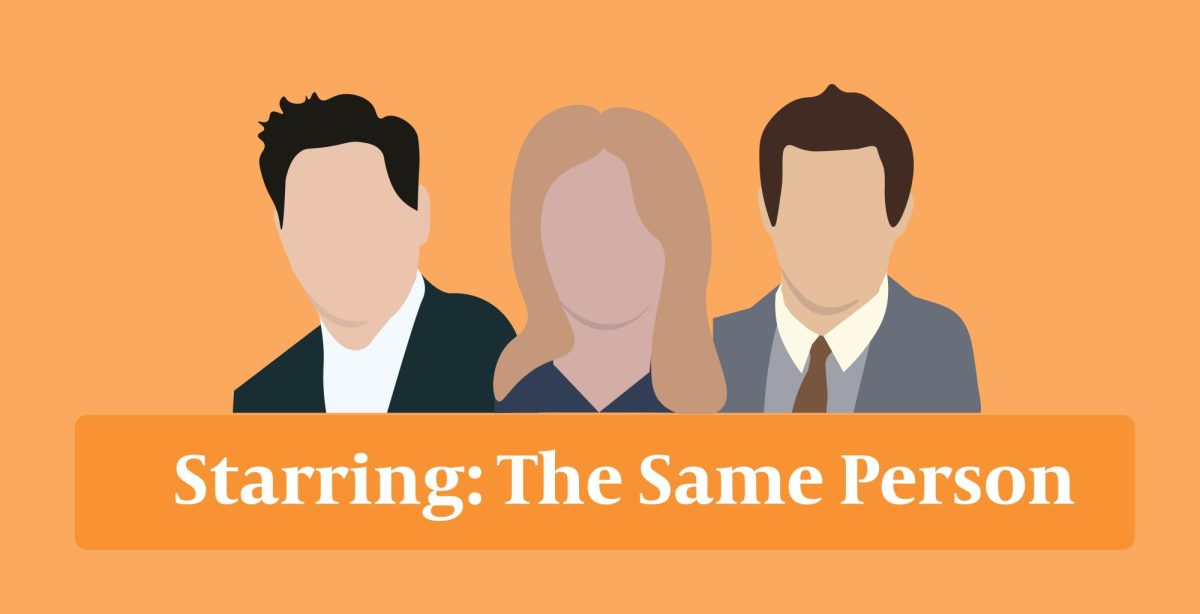With the announcement of an upcoming movie adaptation of Emily Brontë’s 1847 novel Wuthering Heights, the casting of the two lead roles sparked debates among fans. Taking on the roles of Catherine Earnshaw and Heathcliff are Oscar-nominated actress Margot Robbie and BAFTA-nominated actor Jacob Elordi. Despite the popularity of both actors, some have shared the sentiment that their casting is ill-suited in the context of the book. For actress and sophomore Monroe Melton, this casting encapsulates a recent phenomenon in movies – the overuse of actors in lead roles.
“In the past 20 years, if a writer is writing a script, they are writing it based off an actor,” Melton said. “People are no longer writing movies, then casting people. It’s always based off the actor.”
Brandy Ostojic, CHTV faculty adviser and Film Club sponsor, said she agreed with Melton and said studios put popular actors at the forefront of new projects to recapture the popularity of a previous film they starred in.
“For a lot of these actors and actresses, once they have one hit movie, (studios) are going to be like, ‘We can capture that lightning in a bottle again,’ and they’ll continue to put actors like Margot in more movies,” Ostojic said. “Once Hollywood finds that new person who led a movie that did really well at the box office, they’re going to continue to try and reuse them.”
Actress and junior Tashvi Pydimarry said the main motive for these casting choices is to reach an already existing audience of fans of particular actors and actresses.
“It’s mainly for popularity,” Pydimarry said. “Since these actors already have a big fan base and social media presence, they automatically attract people to watch the actors, which essentially makes more money for these studios.”
Despite the possible resonance an actor may create for fans of their previous films, Melton said audiences are becoming fatigued with their recasting in new projects.
“It can create some predictability, especially when actors choose to play similar roles repeatedly or they’re subject to typecasting,” Melton said.
Additionally, Pydimarry said now, up-and-coming actors may find it more difficult to be cast in lead roles.
“(Recasting popular actors is) taking away roles from those looking for their big break and it’s causing a lack of discovery in new actors, which can be quite frustrating,” Pydimarry said. “I think it’s very important (to cast unpopular actors) because it gives people opportunities and it also helps the film industry continue to flourish and thrive.”
From her own experience, Pydimarry said the casting of more well-known actors in roles she auditions for can come across as a let-down.
“It happens not super commonly, but man, it does suck sometimes,” Pydimarry said. “I auditioned for Thalia Grace in ‘Percy Jackson’ when I was 15, last year. The casting was just announced and it went to Tamara Smart. She’s not super well-known, but a lot more well-known than me. It does affect confidence a lot, but it’s important to step back and say that realistically, it was one moment in your life, and life is way bigger than just that.”

However, Melton said in the frequent casting of actors, talent can play a role more so than fame.
“Sometimes when I see that someone got cast in a role that I auditioned for, I’ll notice that they may have had such a better take on a certain character that I would have never thought of,” Melton said.
Overall, Pydimarry said she believes these challenges in casting can lead to greater growth and learning opportunities.
“Emerging actors essentially get beaten down over and over again until they catch that big break,” Pydimarry said. “Quite frankly, it’s a frugal industry but it does build character and helps you realize that it’s just a process. I believe while it shouldn’t be this hard to break into the industry, it shouldn’t be a walk in the park.”
Along with audiences becoming more exhausted seeing popular actors take on lead roles repeatedly, casting choices can potentially sacrifice the integrity of the story retellings by removing the emphasis on the accuracy of character portrayals.
Ostojic said an example of this was a recent adaptation of Louisa May Alcott’s Little Women.
“In ‘Little Women,’ Emma Watson played Meg, and she headlined the movie, but it didn’t seem like an accurate portrayal of the character,” Ostojic said.
The casting of Elordi in “Wuthering Heights” faced backlash as Elordi, a white man, would be playing Heathcliff, who is characterized as “dark-skinned” in the text.
Melton said modern adaptations are less focused on casting accurate adaptations of characters that are described in original source material.
“In the case of Margot Robbie, she’s being cast to popularize the movie, not actually to stay faithful to the story,” Melton said.
Ultimately, Melton said casting directors should prioritize finding the right fit for a character over casting an already well-known actor.
Melton said, “Go for someone who actually fits the role.”

































![AI in films like "The Brutalist" is convenient, but shouldn’t take priority [opinion]](https://hilite.org/wp-content/uploads/2025/02/catherine-cover-1200x471.jpg)










































![Review: “The Immortal Soul Salvage Yard:” A criminally underrated poetry collection [MUSE]](https://hilite.org/wp-content/uploads/2025/03/71cju6TvqmL._AC_UF10001000_QL80_.jpg)
![Review: "Dog Man" is Unapologetically Chaotic [MUSE]](https://hilite.org/wp-content/uploads/2025/03/dogman-1200x700.jpg)
![Review: "Ne Zha 2": The WeChat family reunion I didn’t know I needed [MUSE]](https://hilite.org/wp-content/uploads/2025/03/unnamed-4.png)
![Review in Print: Maripaz Villar brings a delightfully unique style to the world of WEBTOON [MUSE]](https://hilite.org/wp-content/uploads/2023/12/maripazcover-1200x960.jpg)
![Review: “The Sword of Kaigen” is a masterpiece [MUSE]](https://hilite.org/wp-content/uploads/2023/11/Screenshot-2023-11-26-201051.png)
![Review: Gateron Oil Kings, great linear switches, okay price [MUSE]](https://hilite.org/wp-content/uploads/2023/11/Screenshot-2023-11-26-200553.png)
![Review: “A Haunting in Venice” is a significant improvement from other Agatha Christie adaptations [MUSE]](https://hilite.org/wp-content/uploads/2023/11/e7ee2938a6d422669771bce6d8088521.jpg)
![Review: A Thanksgiving story from elementary school, still just as interesting [MUSE]](https://hilite.org/wp-content/uploads/2023/11/Screenshot-2023-11-26-195514-987x1200.png)
![Review: "When I Fly Towards You", cute, uplifting youth drama [MUSE]](https://hilite.org/wp-content/uploads/2023/09/When-I-Fly-Towards-You-Chinese-drama.png)
![Postcards from Muse: Hawaii Travel Diary [MUSE]](https://hilite.org/wp-content/uploads/2023/09/My-project-1-1200x1200.jpg)
![Review: "Ladybug & Cat Noir: The Movie," departure from original show [MUSE]](https://hilite.org/wp-content/uploads/2023/09/Ladybug__Cat_Noir_-_The_Movie_poster.jpg)
![Review in Print: "Hidden Love" is the cute, uplifting drama everyone needs [MUSE]](https://hilite.org/wp-content/uploads/2023/09/hiddenlovecover-e1693597208225-1030x1200.png)
![Review in Print: "Heartstopper" is the heartwarming queer romance we all need [MUSE]](https://hilite.org/wp-content/uploads/2023/08/museheartstoppercover-1200x654.png)




